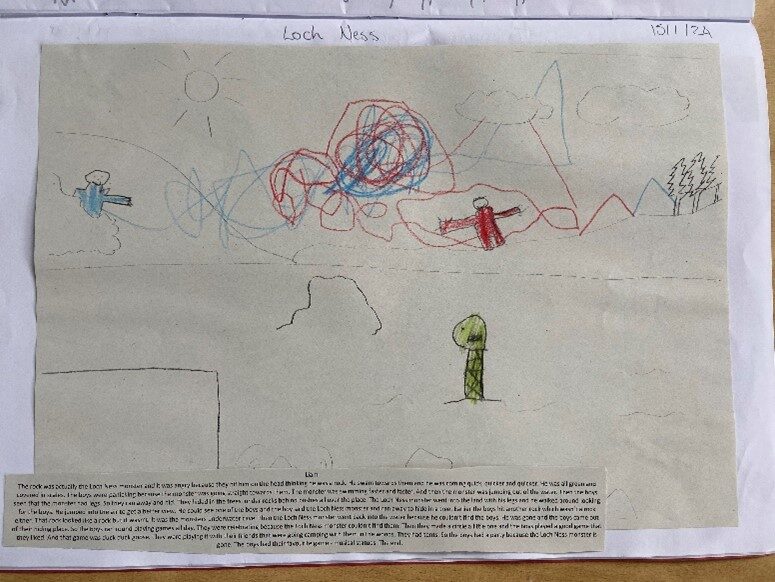
As part of her Masters in Early Years Pedagogy, Frances McMahon, class teacher, led recent work to develop teaching of writing in Larbert Village PS (LVPS). She and her colleagues in school defined the following aims for this work:
- to create a shared understanding and ethos of writing across the school
- to share good practice/engage in professional dialogue
- to discuss plans for moderation of writing
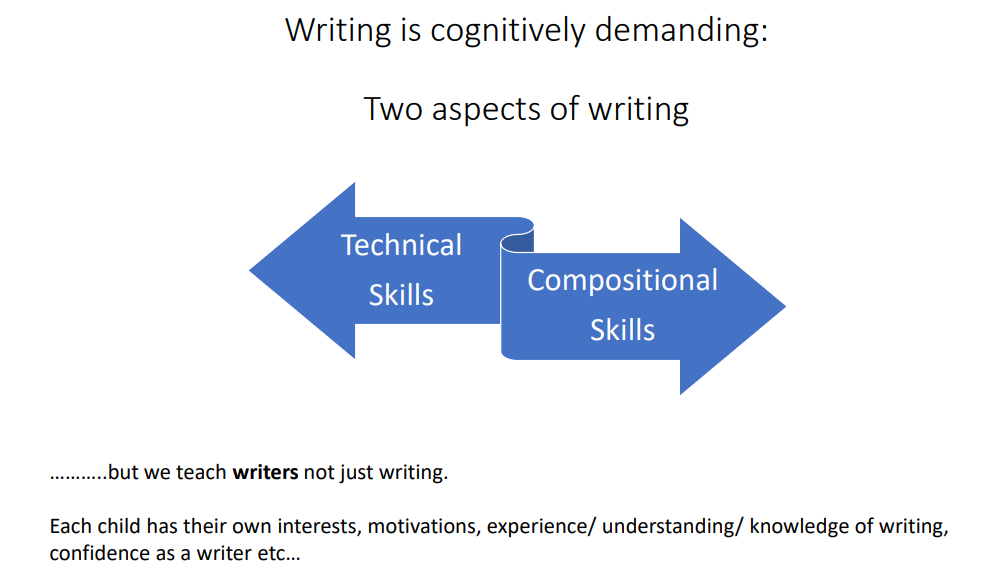 Frances initially facilitated a collegiate meeting with colleagues to share key information about children’s development of writing. This included: why writing matters, the cognitive load required as children learn transcription and compositional skills, teachers’ responses to children’s written work, and the purposes of writing. Falkirk practitioners can view her presentation in more detail in our Literacy in Falkirk Team here.
Frances initially facilitated a collegiate meeting with colleagues to share key information about children’s development of writing. This included: why writing matters, the cognitive load required as children learn transcription and compositional skills, teachers’ responses to children’s written work, and the purposes of writing. Falkirk practitioners can view her presentation in more detail in our Literacy in Falkirk Team here.
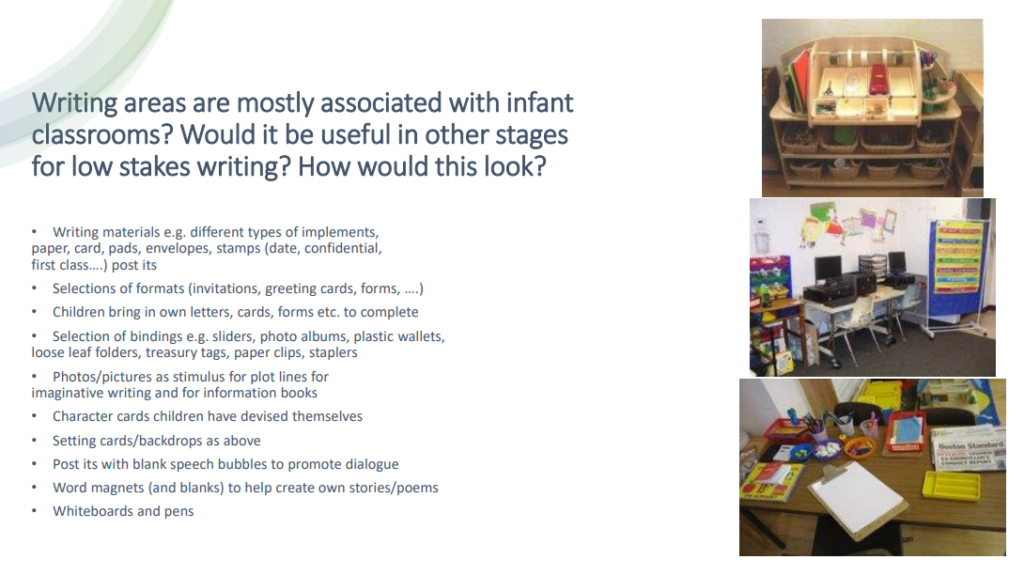
Larbert Village PS teachers then explored different approaches to writing which included:
- Shared writing: helps to highlight what goes on in a writer’s head, whilst being a partner in the process
- Modelling writing: strategic intervention, teacher or peer modelling the process or specifics e.g. sentence structure and punctuation
- Guided writing: conferencing 1:1 or small group. Talking to the child about their writing as a reader not an assessor. Scaffolding them to think about the purpose/ audience help them get out what they are trying to say
- Building in opportunities for paired and group readings of writing for children to check they have said what they wanted to say
- Low stakes writing (less pressure) building to high stakes (more formal pieces of writing with success criteria)
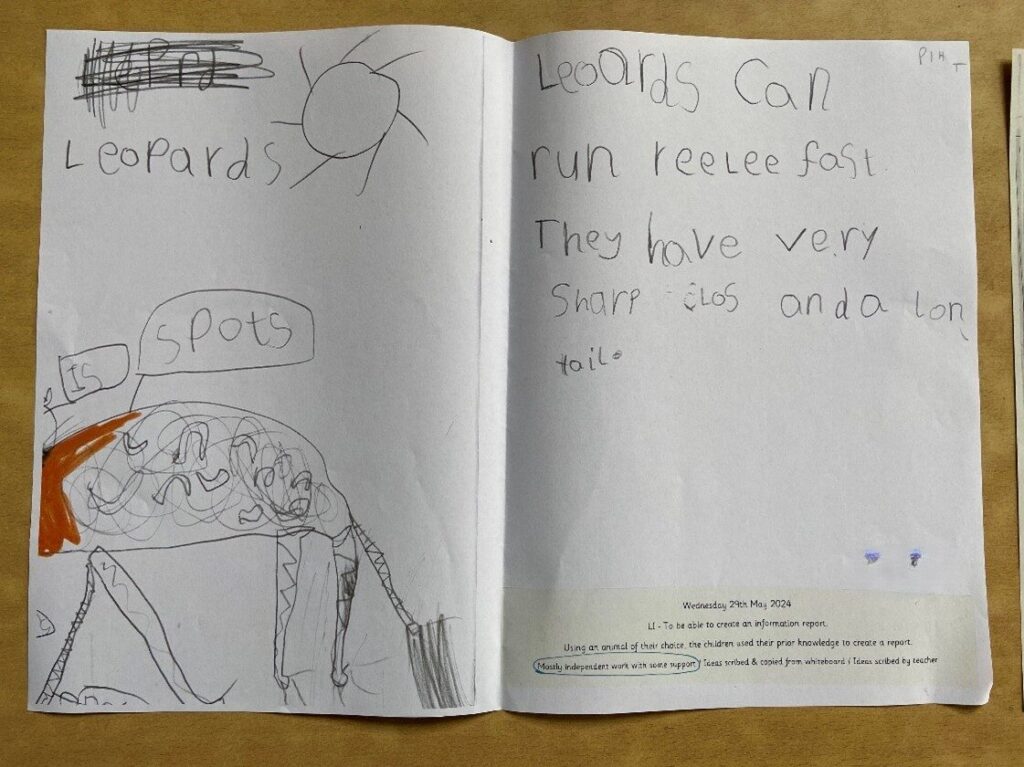
Staff spent time during this session exploring low stakes writing and sharing current writing practice. They then agreed to use the PM Writing framework to structure their teaching of information report writing during a 5 week period so that they could then moderate the resulting pupil evidence together.
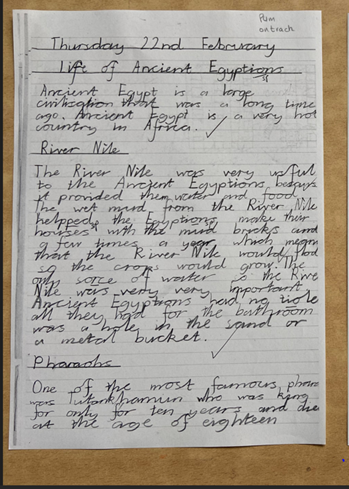
On the May in-service day teachers met with stage partners to moderate this evidence and valued seeing the progression of writing for this purpose from primary 1 – 7. The examples shared here are from primary 1, 4 and 7. Staff used the core and information report writing targets from PM during this moderation process. When reviewing this whole writing initiative, teachers raised issues about the variation in teaching practices used, how each learning experience had been planned and the degree of scaffolding provided for pupils. They recognised that all of these factors affected the validity of their assessment and moderation of children’s evidence of writing.
As a result, next session, they will take quality time to plan their writing lessons and will moderate their planning, teaching and assessment together. Their moderation will focus on a range of pupil evidence and purposes for writing (writing genres). Throughout this work, they will apply their knowledge of the demands of writing development for children. They will build in small changes to their writing teaching practice too.

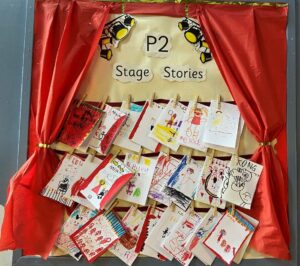
Frances and colleagues teaching primary 1 and 2 children in Larbert Village PS have adopted specific pedagogical approaches to support early development of writing. They build on the use of Helicopter Stories in the nursery by continuing to capture children’s story-making through similar strategies. Children sit around a delineated space and volunteer to share their improvised narrative tales. They direct fellow pupils in role as their characters to act these out while the teacher scribes the tale. In this way, children build their capacity to create characters, setting, storylines, beginnings, middles and conclusions. Their communication, vocabulary, speech and sequencing skills are all developed in a fun and non-threatening way. These are known as “Stage Stories” in LVPS and each classroom displays these tales to celebrate and share this playful, adult and child-initiated learning.
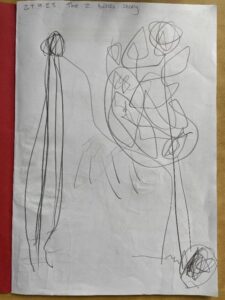
Foundations of Writing is also employed by teachers as a developmentally appropriate adult-directed way to scaffold children’s development of the physical skills and cognitive capacity to write. Teachers using this drawing-based programme initially encourage children to make representative line drawings which they then scribe in writing for each child. These drawings depict not only the way things look to the children, but also less tangible information such as the movement of things being shown.
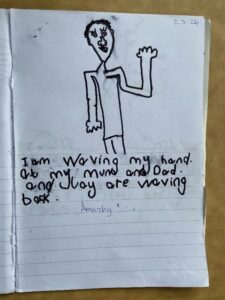
The teacher gradually initiates or directs children to increasingly detailed drawings/depictions of events and stories. As they draw increasingly complex and detailed lines, shapes, and patterns, children develop the fine motor skills and muscle stamina to make the transition to letter formation. When “telling” their picture/story to the teacher/adult who is scribing for them they understand the symbolic and representative nature of mark-making and begin to connect phonemes and graphemes in a gradual and natural way.
Frances and colleagues observe each child’s progress carefully to identify when their letter-formation and blending becomes reliable enough for them to write independently.
To read another post about Foundations of Writing click here.
